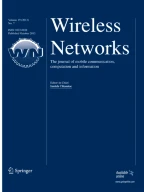Abstract
The emergence of several radio technologies, such as Bluetooth and IEEE 802.11, operating in the 2.4 GHz unlicensed ISM frequency band, may lead to signal interference and result in significant performance degradation when devices are colocated in the same environment. The main goal of this paper is to evaluate the effect of mutual interference on the performance of Bluetooth and IEEE 802.11b systems. We develop a simulation framework for modeling interference based on detailed MAC and PHY models. First, we use a simple simulation scenario to highlight the effects of parameters, such as transmission power, offered load, and traffic type. We then turn to more complex scenarios involving multiple Bluetooth piconets and WLAN devices.
Similar content being viewed by others
References
BlueHoc: Bluetooth Performance Evaluation Tool, Open-Source (2001) http://oss.software.ibm.com/developerworks/ opensource/~bluehoc
Bluetooth Special Interest Group, Specifications of the Bluetooth system, Vol. 1, v.1.0B Core, and Vol. 2, v1.0B Profiles (December 1999).
T. Ekvetchavit and Z. Zvonar, Performance of phase-locked loop receiver in digital FM systems, in: Ninth IEEE International Symposium on Personal, Indoor and Mobile Radio Communications, Vol. 1 (1998) pp. 381-385.
G. Ennis, Impact of Bluetooth on 802.11 direct sequence, IEEE P802.11 Working Group Contribution, IEEE P802.11-98/319 (September 1998).
D. Fumolari, Link performance of an embedded Bluetooth personal area network, in: Proceedings of IEEE ICC'01 Helsinki, Finland (June 2001).
N. Golmie and F. Mouveaux, Interference in the 2.4 GHz ISM band: Impact on the Bluetooth access control performance, in: Proceedings of IEEE ICC'01, Helsinki, Finland (June 2001).
N. Golmie, R.E. Van Dyck, and A. Soltanian, Interference of Bluetooth and IEEE 802.11: Simulation modeling and performance evaluation, in: Proceedings of the Fourth ACM International Workshop on Modeling, Analysis, and Simulation of Wireless and Mobile Systems, MSWIM'01, Rome, Italy (July 2001).
I. Howitt, V. Mitter and J. Gutierrez, Empirical study for IEEE 802.11 and Bluetooth interoperability, in: Proceedings of IEEE Vehicular Technology Conference (VTC) (Spring 2001).
IEEE Standard 802-11, IEEE standard for wireless LAN Medium Access Control (MAC) and Physical Layer (PHY) specification (June 1997).
A. Kamerman, Coexistence between Bluetooth and IEEE 802.11 CCK: Solutions to avoid mutual interference, IEEE P802.11 Working Group Contribution, IEEE P802.11-00/162r0 (July 2000).
A. Kamerman and N. Erkocevic, Microwave oven interference on wireless LANs operating in the 2.4 GHz ISM band, in: Proceedings of the 8th IEEE International Symposium on Personal, Indoor and Mobile Radio Communications, Vol. 3 (1997) pp. 1221-1227.
J. Lansford, A. Stephens and R. Nevo, Wi-Fi (802.11b) and Bluetooth: Enabling coexistence, IEEE Network Magazine (September/October 2001).
S. Shellhammer, Packet error rate of an IEEE 802.11 WLAN in the presence of Bluetooth, IEEE P802.15 Working Group Contribution, IEEE P802.15-00/133r0 (May 2000).
M.K. Simon and C.C. Wang, Differential versus limiter-discriminator detection of narrow-band FM, IEEE Transactions on Communications COM-31(11) (November 1983) 1227-1234.
A. Soltanian and R.E. Van Dyck, Physical layer performance for coexistence of Bluetooth and IEEE 802.11b, in: Virginia Tech. Symposium on Wireless Personal Communications (June 2001).
M. Takai, R. Bagrodia, A. Lee and M. Gerla, Impact of channel models on simulation of large scale wireless networks, in: Proceedings of ACM/IEEE MSWIM'99, Seattle, WA (August 1999).
S. Unawong, S. Miyamoto and N. Morinaga, Techniques to improve the performance of wireless LAN under ISM interference environments, in: Fifth Asia-Pacific Conference on Communications, 1999 and Fourth Optoelectronics and Communications Conference, Vol. 1 (1999) pp. 802-805.
J. Zyren, Reliability of IEEE 802.11 WLANs in presence of Bluetooth radios, IEEE P802.11 Working Group Contribution, IEEE P802.15-99/073r0 (September 1999).
S. Zurbes, W. Stahl, K. Matheus and J. Haartsen, Radio network performance of Bluetooth, in: Proceedings of IEEE International Conference on Communications, ICC 2000, New Orleans, LA, Vol. 3 (June 2000) pp. 1563-1567.
Author information
Authors and Affiliations
Rights and permissions
About this article
Cite this article
Golmie, N., Van Dyck, R., Soltanian, A. et al. Interference Evaluation of Bluetooth and IEEE 802.11b Systems. Wireless Networks 9, 201–211 (2003). https://doi.org/10.1023/A:1022821110023
Issue Date:
DOI: https://doi.org/10.1023/A:1022821110023
